Alongside a boom in private universities in Germany, state institutions are increasingly supported by private funds. They don't see this jeopardising their independence but campaigners are calling for greater transparency on where the money is coming from

Science|Business - Table.Media partnershipScience|Business has partnered with Table.Media, a leading source of news about higher education and research in Germany. Each week, we are publishing one of each other’s stories to give readers an even broader range of insight into R&D policy across Europe. |
The number of private universities in Germany has skyrocketed in recent years. Twenty years ago, there were 49, now according to a recent analysis by the Centre for Higher Education, there are 115 – more than twice as many. Over the same time, the number of students attending them has quadrupled.
The private universities have various sponsors, including companies and family wealth funds. Three prominent examples are the former Jacobs University in Bremen, which the Jacobs coffee dynasty family financed. It has since been renamed the Constructor University and sold to the Russian-Singaporean investor Serguei Beloussov.
In 2003, Klaus-Michael Kühne, majority owner of the logistics company Kühne and Nagel, founded the Hamburg School of Logistics together with the City of Hamburg and the Technical University of Hamburg. This later became the Kühne Logistics University. And since 2010, the foundation of Dieter Schwarz, the founder of the Lidl and Kaufland supermarket chains, has been expanding the education campus in Heilbronn. Among other things, there is an elite programming school, a foundation-owned academy and a start-up forge.
Philanthropy
At the same time, state universities are increasingly supported through third-party funding and endowed professorships. For example, since 2018, the Dieter Schwarz Foundation has endowed a total of 41 professorships at the Technical University of Munich (TUM), 32 of which are located on the TUM Campus in Heilbronn. Such wide-scale philanthropy has not been seen before in Germany.
More and more universities are having chairs sponsored. Starting this year, the Edeka Group, Germany’s largest supermarket chain, will support a junior professorship for sustainable consumer behaviour at Leuphana University Lüneburg. In addition, Edeka will provide additional funding for research, according to Leuphana University.
At the RWTH Aachen University a computer science professorship funded by the auto manufacturer BMW will be filled starting this year.
According to the Federal Statistical Office, RWTH Aachen led in third-party funding per professor in 2021 with €932,100, followed by TUM with €799,800 per professor and the University of Stuttgart with €763,600.
With endowed professorships, companies, foundations, associations or organisations usually approach universities directly, said Thorsten Karbach, spokesman for RWTH Aachen. Usually, there are already long-standing relationships in the form of cooperations on other levels or in joint projects. "RWTH Aachen collaborates with many companies across its faculties. These companies are actively communicated in publications because we see them as added value for ongoing research," Karbach said.
The energy provider E.ON sponsors the E.ON Energy Research Centre at RWTH and put a total of €10 million into joint projects between 2021 and 2026, according to Karbach. In addition, up to half a million euros are provided annually to finance non-profit projects.
Corporate funding and support from associations and foundations, “can ensure even higher quality research," said Karbach. It also creates more flexibility; there are more research topics that can be addressed. And students come into contact with potential employers early on in this way.
The RWTH Aachen, along with the E.ON ERC and its now seven chairs, has been directly or indirectly involved in numerous advances in electromobility, photovoltaics and energy storage technology.
But do companies also influence research results? "No," says Karbach. "Academic freedom is a high good and research is always open-ended."
TUM makes the same case. "Of course, one could argue that it would be the state's task to finance the development of the TUM. It is certain, however, that the Dieter Schwarz Foundation has no influence on who TUM appoints as a professor or what they will work on later. There is definitely no influence," says TUM.
Benefitting from research results
However, Christopher Bohlens, head of the science working group at the pressure group Transparency International, sees a potential influence of companies on research. "Companies usually finance endowed professorships in an area in which they themselves are active. They try to benefit from the research results, commission research orders deliberately," he said.
While it has no issue with third-party funding per se, Transparency International does have a problem with the lack of transparency. "We are critical of the fact that these financial flows are often not transparent at all: where does the money come from? How much was invested? What for?" said Bohlens.
The exact amount that has flowed into the TUM educational campus in Heilbronn, for example, remains unclear. TUM declined to comment. Moreover, in-kind donations and sponsorships are often not communicated, noted Bohlens. Only in a few federal states, such as Lower Saxony, must universities publish once a year the donations and sponsorships they have received.
"We are already concerned and are observing that third-party funding is increasing more and more. Ultimately, it is also about plugging financial holes at universities," Bohlens said. The boom of private universities, in particular, leads to ever-increasing competition. "Additional financial sources from the economy come in handy there."
This text appeared for the first time in Research.Table, a professional briefing from the largest independent start-up for quality journalism in Germany. The editorial team reports for the key people in the research scene who set and fill the framework for science, research and development.






 A unique international forum for public research organisations and companies to connect their external engagement with strategic interests around their R&D system.
A unique international forum for public research organisations and companies to connect their external engagement with strategic interests around their R&D system.